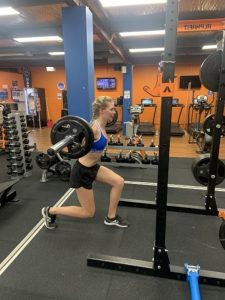I am a runner not a gym junkie, why do I need to be strength training?
The Longevity Exercise Physiology Team in Drummoyne,Edgecliff, Marrickville,Bella Vista, Randwick, Lindfield and Balmain look at the importance of a holistic exercise program for runners.
For many recreational runners, strength training may be looked at as not necessary, or even counterintuitive. Why would you want to put on muscle mass if it means you have to carry around more weight when you’re running? To answer this question briefly, it reduces your risk of injury, helps you run faster, and improves your running economy. If that is not enough to convince you, then keep reading!
Our Exercise Physiologist Georgia has been competing in athletics as a middle-distance runner for over 10 years. We asked her for some advice on designing specific strength programs for runners and why it should not be overlooked.
After years of repeated injury, Georgia certainly understand the role resistance training plays in rehabilitation and prevention. Running produces a much greater forcer than walking. If the integrity of our muscles, connective tissue and joints are compromised, we expose ourselves to greater risk of injury. Strong muscles, ligaments and tendons can guard against impact. If muscles are weak, we will also see inconsistencies in our gait. Some muscles will be overworked to compensate, and the entire stride is disrupted. It is common for a lot of runners to lack strength in at least one muscle group. The role of strength training is to correct these imbalances and improve our neuromuscular control, allowing our muscles to fire more efficiently. The result, an improved running economy and more robust joints and muscles.
It is important to remember not all types of strength training are equal. We must create a program which is specific to our goals, and in the case of many runners, this should be to improve strength and power. If you are running on a regular basis, you probably don’t need any more cardio, so steer clear of cross fit style classes that are aerobic based as these will not be as effective in developing strength. For strength we want to be aiming for between 3 sets of 8-12 reps for each exercise at a relatively heavy weight (7/10 RPE.) Don’t forget that body weight exercises can also be very effective for challenging our stability and coordination. If we shift our attention over to developing power, typically the resistance is lower, and the velocity of the movement is higher. The focus should be to lift, push or pull resistance as quickly as you can. Power training plays a crucial role in improving our neuromuscular control and our ability to generate force. Plyometric exercises also fall under the power umbrella and you should consider including in your strength program.

So, what exercises specifically should you be including in your training? Of course, our major lifts including, squats, deadlifts and cleans are all important, but do not overlook the importance of single leg exercises. When we run, unlike walking, we never have both feet on the ground at the same time. This means we need to be strong in single leg stance to ensure we translate the forces through our body effectively. Try adding in some Bulgarians, lunges, single leg dead lifts and step ups. These exercises challenge our stability and strengthen our muscles in a similar position to what we are when we are running. Lastly, do not neglect your upper body! Although our legs do a lot of the work to propel us forward, there is no athlete that does not train whole body strength. Our Exercise Physiologist and experienced runner Georgia likes to include upper body exercises that also challenge core stability such as push up into side plank and arabesque bent over row.
If you can add two strength training sessions into your week that follow the advice above, you will put yourself in a great position to improve your overall running performance and reduce your risk of injury. However, we understand starting from scratch can be a little bit dauting, so if you feel like you need more assistance or guidance, you can book in with one of our experienced exercise physiologists to help get you started.
1300 964 002
Written By Georgia

